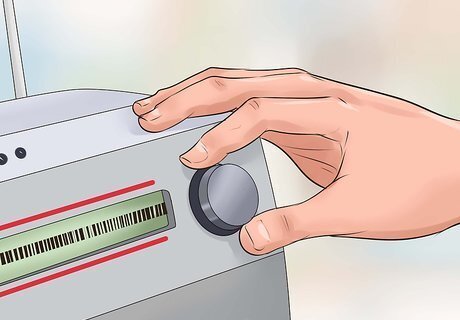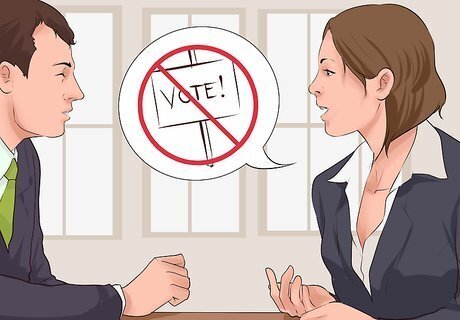
views
Preparing for the Talk

Set the mood. Many times politics will come up in conversation at an event where you’re not expecting it. However, if you’re planning to hold a talk with someone about politics, setting the stage properly can make a world of difference in how the meeting goes. If you can, play music in the background. Hearing some tunes during your discussion can prevent awkward silences. Additionally, music can have an effect on a person’s tone and attitude, which can possibly improve the outcome of the conversation. Play it at a low volume so people don’t have to struggle to be heard. Listening to the blues and reggae can actually make you less nervous. Broadway music is inspiring, and rock and classical music can change your average mood to a great one. Heavy metal does not always put one in an aggressive mood, but country music can cause depression, so avoid it for these chats.

Remind yourself that you are friends. Talking to a friend should be vastly different than talking to your worst enemy, and you should try to remember the difference between the two going into your conversation. Although politics can bring out the worst in some people, it’s important to remember that you were friends before the election, and that hopefully you’ll be friends afterwards. Remember to put your relationship first before politics and you’ll likely come out of the situation just as good as when you went in. Make sure to end the conversation and continue at a later time if you feel it is getting too heated and negatively impacting your relationship.

Go in with a focus on learning. It’s important to approach these discussions with an open mind. Your friend has many appealing characteristics; if they didn’t, you wouldn’t be friends. As such, there’s a good chance your pal has valid reasons for thinking the way they do, and you may actually agree with them. If you go into the conversation with a mindset that is focused on learning why your friend feels this way, instead of wanting to bash their beliefs or change their mind, you’ll likely have a productive conversation that ends well. For example, you could say, “I’m having a difficult time understanding the other side of the story. Perhaps you can help me.” You could also begin the conversation by saying, “I know how I feel about the topic, but I’m curious as to why you feel so differently. Would you mind sharing your position on the matter?”
Saying Your Piece
Don’t expect to change their mind. Don't come into the conversation expecting to change their beliefs or point of view. This will only frustrate you both. Your goal should be to hear each other out with as little judgement as possible.

Stay respectful. Name-calling and low blows may work for politicians, but it doesn’t usually work for friends. Avoid saying anything negative about your friend or their political views. Instead, focus on your beliefs. Asking questions in a polite way about why your friend feels the ways they do, however, helps them feel like their opinion matters to you. For instance, you could tell your friend, “I value you and your opinion. I don’t assume I am right.” Additionally, if you start to feel resistance from your friend about a certain topic, you can make them feel at ease, while still trying to get your point across by saying, “I’m fine steering clear of it if you’re not ready to go there, but can I give you my perspective?” Don't get personal or resort to personal attacks.

Monitor your tone. It’s easy to get worked up when talking about politics, but getting too out of line can end friendships. Avoid trying to match the volume of your friend if they get upset, as the conversation will then likely escalate out of control. Instead, stay calm and collected. Be a good example for how you want your friend to behave. If you find yourself unable to stay calm and rational, keep in mind that you are not trying to attack the person—who’s your friend—but you simply disagree with the idea. This should help you maintain a calm demeanor when discussing potentially heated topics.

Think before you respond. Your friend just went on a 15-minute rampage bashing your favorite politician. You can feel your blood boil and have the perfect comeback, but hold that thought. Give yourself time to cool off and prepare an appropriate response before you say something that you may regret. Tell your friend you would like to visit the restroom, need to make an emergency phone call, or have to check on your child if you need an excuse to leave the room to collect yourself and maintain your cool. Additionally, simply saying “Can you excuse me for a moment” is often effective and will give you a chance to breathe before you continue the conversation.

Attempt a one-on-one conversation. There’s nothing like a heated political debate to make things awkward at a dinner or get-together. Instead of making people around you feel uncomfortable, save this kind of talk for a time when you can speak privately to your friend. Not having others around can also prevent them from getting into the conversation and adding fuel to the fire, and prevent several people ganging up on one person with a different opinion.
Listening with Respect

Acknowledge your friend’s view. Everyone wants to feel valued in a relationship, and even in a conversation. If after listening, you go directly into your opinions and views without consulting with your friend on theirs, they will likely check out of the talk. Instead, acknowledge their thoughts and give them value. Respond by saying, “I understand you’re coming from a difference place and why you feel the way you do. Here’s my background and why I feel differently.”

Listen and stay engaged. One of the biggest ways to turn a friend off of the conversation is by pretending to listen when you’re not really interested. Try not to act like you’re staying engaged when you are really waiting for the other person to stop talking so that you can say what you want. Stay focused and in tune with what the other is saying, and you may receive the same treatment. Give the person your full attention, rather than thinking of how you’ll respond.

End the conversation on a respectful note. If you come out of the conversation having changed your friend’s mind, you’re one of the few. If you still can’t understand each other’s point of views, you can at least end the conversation in a respectful way by agreeing to disagree. Doing so can keep you on speaking terms and leave the possibility open for a further discussion. Avoid saying, “Let’s change the subject” or “Let’s move on.” This puts you in control of the conversation and can leave your friend feeling pushed around. Instead, try “Thank you for this conversation. I’m glad we had the chance to share our opinions with each other.”



















Comments
0 comment